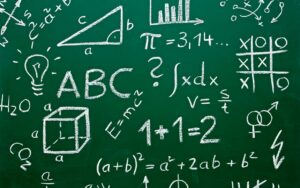Keeping math skills sharp outside of high school or college can be challenging. While many jobs require the use of basic math skills, higher math skills are typically forgotten outside of math focused fields such as engineering, business finance, administration, and architecture.
Fortunately, there are ways to maintain and even refine mathematical ability for people working in other, less mathematically focused.
Take A Class
If it has been a while since high school or college, taking a math class may be helpful. Fortunately, there are numerous learning options available, designed to fit any schedule or interest.
For most, enrollment in a local college, university, or community education center can provide the focused instruction needed to dust off math skills from high school or college.
If an in-person enrollment isn’t an option, there are many online options, including online schools and traditional colleges and universities that offer online courses.
Play Mathematical Games
Mathematical games are an excellent way to warm up to working on more complex mathematical problems. Puzzle games such as Sudoku help teach logic and sequential problem-solving approaches. Sudoku and other logic based math puzzles can easily be found online through sites such as:
http://www.websudoku.com
https://www.mathplayground.com/logic-games.html
Design A Project
Another way to begin stretching math muscles is to design a household project, such as a new fence, patio, or piece of furniture.
Even if the project doesn’t get carried through to completion, the process of measuring dimensions, estimating material needs, and examining project costs requires a great deal of math and will certainly provide unique and interesting challenges based on the project selected. Depending on the project, algebra, geometry, and possibly trigonometry could be needed.
For a greater challenge, choose design projects that use angles other than the typical 90-degree square and practice calculating interior angles using trigonometry.
Read A Book
While math textbooks are typically written for classroom use, there are many study and reference guides written for every mathematical subject, and can be typically be found online through retailers such as amazon.com
Many reference guides are written to supplement classroom texts or for professionals such as engineers to reference. Books and reference cards are typically grouped by subject, such as algebra or geometry, and can provide useful illustrations, examples, and formulas to help develop an understanding of mathematical concepts.
For a deeper understanding of the mathematical subject, combine book reading with a project. The process of reading a theory and incorporating it into a hands-on application helps cement the concept for longer-term knowledge retention.
Tutor a Child
For those looking to make a positive difference in a community in addition to brushing up on math skills, tutoring an elementary, middle, or high school student could be the answer.
There are a few steps that need completing before schools will open the doors to a potential tutor, though.
First, it is important to speak with the school principal. There is often paperwork that must be filled out as well as a background check and possibly school board approval.
Once these steps have been completed, speak with the math teacher to gather materials and information to study before beginning tutoring. Knowing the information well enough to explain it to a student is vital to being a successful tutor.
As tutoring begins, the preparation and mathematical practice will pay off for both tutor and student, as both will develop mathematical skills and confidence in the subject.
Final Word
Regardless of the method, developing mathematical understanding can open doors to new projects or hobbies, and could even positively impact the life of a child.
Determine an interesting approach, dedicate some time to learning the new material, and enjoy the outcome from refining and expanding mathematical abilities.

